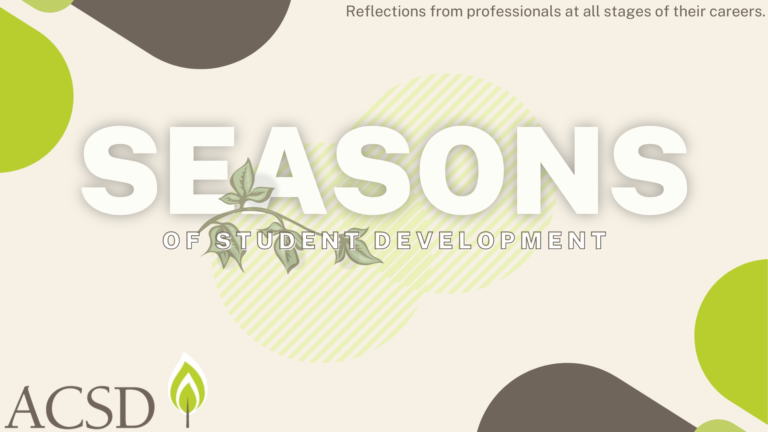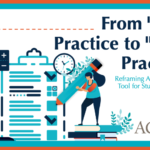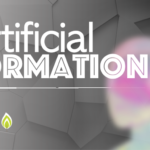![]() This content is brought to you by the Association for Christians in Student Development (ACSD), a volunteer membership organization committed to equipping and challenging faithful professionals to infuse their Christian faith into student development practice and scholarship. Thoughtful content such as this is made possible by volunteer contributions and the financial support of membership dues. Interested in becoming a member for more awesome content just like this? Join today by clicking here!
This content is brought to you by the Association for Christians in Student Development (ACSD), a volunteer membership organization committed to equipping and challenging faithful professionals to infuse their Christian faith into student development practice and scholarship. Thoughtful content such as this is made possible by volunteer contributions and the financial support of membership dues. Interested in becoming a member for more awesome content just like this? Join today by clicking here!
Reminding myself of the “holy nature” of my work.
Realistically, I am at the tail end of my vocation. Very clearly, God called me to work with college students. For over twenty years I have supported traditional undergraduates who lived on campus. For the four years, my support has extended to those who have lived off campus. However, I have also supported graduate students, colleagues and residential students as circumstances required. Throughout these years, many students have not been “traditional” or those we might see as “typical” – many are on the margins or under the radar because of their personal experiences, background, heritage or just being underrepresented.
Many have come across my path.
In the 2002 movie “Four Feathers”, one of the characters who has been rescued from captivity, asks is rescuer “Why are you protecting me?”. The answer he receives is “God put you in my way. I have no choice.” For me, that answer sounded reluctant, transactional, and a little unsettling.
Towards the end of the film the men part ways and one asks the other where he is going. He replies, “To see who else God puts in my way.” That answer finally resonated with me. I like the perspective that my interactions with students are orchestrated by the Holy Spirit and have the potential of having eternal consequences.
Conduct, investigations, and responding to poor decisions have become my wheelhouse. I did not anticipate that they would be such a significant part of my vocation. At numerous points in my journey I was ready to close the chapter because of the tension, stress, and unwelcome nature of this part of my work.
Some years ago, I was confronted with the holy nature of my work. I understand that “holy nature” is an odd choice of words, but I feel that is the right descriptor. Being able to deeply understand what occurred, what decisions were made, and the context of the experience, allows me to tell the student’s story and experience with faithfulness and integrity. I can represent them with veracity and fidelity. Those are sacred values.
Even if I do not ascribe responsibility, my faithfulness and accurate representation of their experience is laced with truthfulness, respect, kindness, patience, and other virtues which we would identify as “fruits of the spirit.”
I have learned, often from my own errors, that there are values I need to remember.
- Be Generous. I choose to think the best of others. It may be naïve, but I prefer to live this way rather than to live with the cynicism I could easily embrace. I try to not take things personally. Students may intentionally and unintentionally deceive you. They may stand you up, they will miss meetings with you, and they may misrepresent you. Students may do things that colleagues, friends and family do not do. Most of the time they are NOT intentional, nefarious or consciously directed at you. They may be directed at your role or the institution, seldom at you personally. Years ago, I was named in a lawsuit initiated by a student and directed at my institution. I had never met the student. He had scrolled down the university web pages and identified individuals from the posted information. I believe the saying is that if you “shoot a barn with a shotgun, you will probably hit it.” The student was using this broad strategy, but there was nothing personal – I was just in his line of fire.
- Be Patient. Slow down. In situations where no one is in danger and circumstances allow, if you are trying to discern what occurred, always be patient. Take your time and consider all possibilities. Be thorough and diligent. Push back on pressure to go quickly. Going quickly is not honoring students or yourself. Take the time to ponder. It feels like wasting time, but it will be beneficial. Sometimes the pressure is internal, sometimes it is from the institution, sometimes it is from colleagues, and sometimes it is hard to identify from where the pressure is coming. I remind myself to be diligent and thorough. Sometimes students’ class and work schedules do not allow for quick responses. Sometimes weekends and holidays do not coincide with an investigation’s timeline. If I want to value equity, justice, and integrity, I will take time and be patient.
- Be Respectful. Honor the stories you hear. Honor and respect students’ experiences and stories as having unrealized value. Sometimes the value is only for the student who is telling you their experiences. In scripture Jesus admonished his followers not to “throw pearls before swine” (Matt 7:6). Understanding that I am interpreting this passage with poetic license, I do not want to be a “swine.” I want to treat the precious “pearls” I receive, hear, and am trusted with as valuable – possibly sacred – and with respect. I want to not only trust, but I want to be trustworthy.
Reminding myself of the eternal and sacred nature of our work is both a gentle rebuke and encouragement. Seeing who God puts in my way keeps me attentive, humble, but also delighted. I am often amazed and a little startled that the Spirit of God would partner with me (and you) by bringing others in my way.
In this season when we are often reminded of Emmanuel (God with us), I love that we get to be His presence for others.
Be encouraged. Merry Christmas.







